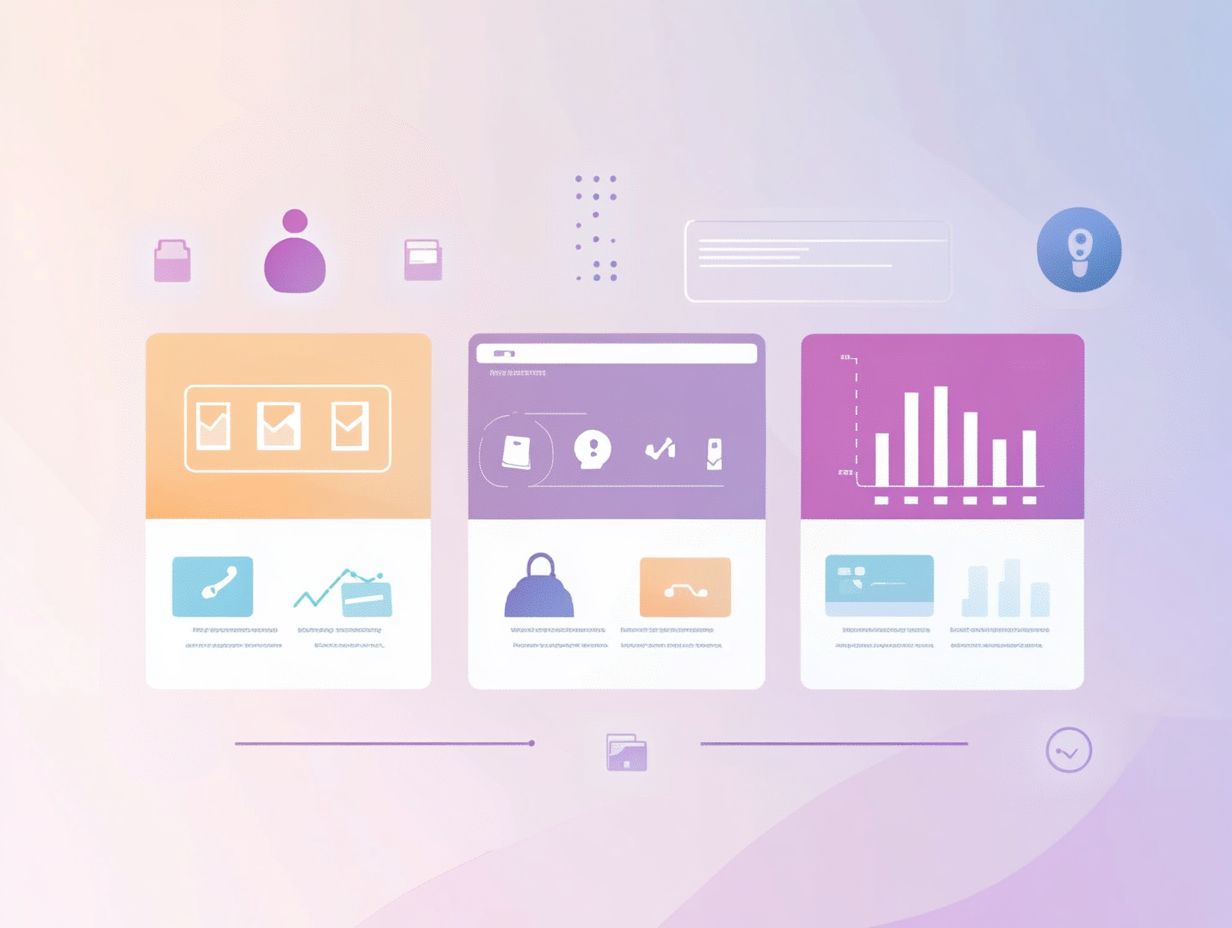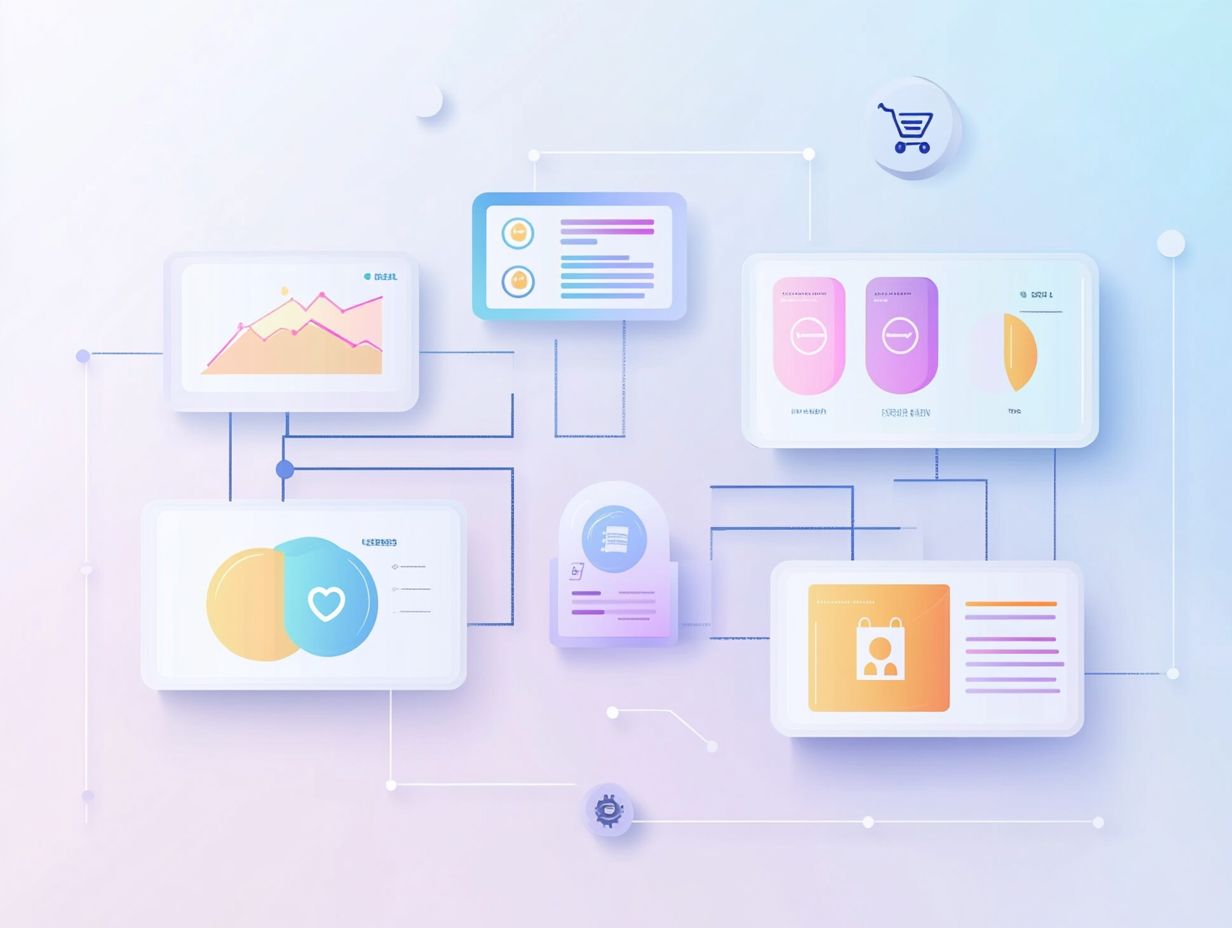What Are the Differences Between CRM Types?
In today’s fast-paced business landscape, grasping the intricacies of customer relationships is essential for your success. This article explores the various types of Customer Relationship Management (CRM) systems: Operational, Analytical, and Collaborative. Each serves a distinct purpose.
You ll uncover their features, benefits, and real-world applications, along with valuable insights on selecting the right CRM for your business. We ll also cover integration and customization options to help you maximize your CRM’s capabilities.
Discover how the right CRM can transform your customer interactions and propel your growth forward.
Contents
Key Takeaways:

Operational CRM automates and optimizes customer-facing processes. Analytical CRM gathers and analyzes customer data for strategic decisions. Collaborative CRM enhances customer engagement and departmental collaboration, leading to improved service and satisfaction.
When choosing a CRM, consider your business needs, budget, and integration and customization options. This ensures you find the most effective solution for your organization.
Defining CRM and its Purpose
Customer Relationship Management (CRM) includes tools and methods to help manage customer relationships. This approach enhances your relationships with customers, boosts retention rates, and drives sales growth by leveraging customer data for a personalized experience.
By integrating components like sales tools, marketing automation, and customer service software, you can streamline operations and cultivate deeper customer engagement. The importance of CRM in today’s business environment is undeniable. Systems like Salesforce, HubSpot, and Dynamics 365 offer functionalities tailored to various CRM aspects.
Operational CRM automates customer-related processes, allowing your teams to respond swiftly and efficiently. Analytical CRM provides insights from customer data, enabling informed decisions that refine your strategies. Collaborative CRM elevates communication, ensuring every team member accesses relevant customer information, creating a seamless experience for customers.
By harnessing these CRM solutions, you can not only maintain but also strengthen your customer relationships.
Operational CRM
Operational CRM comprises elements that directly enhance your sales, marketing, and customer service processes. It automates and streamlines tasks like lead management and customer service operations, boosting efficiency and elevating the customer experience.
This sophisticated CRM approach helps you manage customer data effectively, paving the way for enhanced satisfaction and retention.
Features and Benefits
The features of operational CRM are crafted to streamline processes and enhance efficiency in sales and customer service. Key features include:
- Sales automation, simplifying lead tracking and management.
- Customer service software, enabling your team to resolve inquiries and issues effectively.
With operational CRM, you gain robust contact management and the ability to track sales interactions. This allows you to harness valuable customer insights for well-considered choices. Automated lead qualification ensures prioritizing the most promising prospects, freeing your sales teams to nurture high-potential leads.
Self-service channels let customers access information and resolve issues independently, leading to quicker turnaround times and reducing the workload for customer service representatives. By integrating these functionalities, operational CRM enhances productivity and cultivates a proactive approach to managing customer relationships. This allows your teams to anticipate needs and drive higher retention rates.
Explore your CRM options today to find the perfect fit for your business!
Analytical CRM

Analytical CRM centers on careful analysis of customer data to elevate your decision-making and strategic planning.
Use relevant customer data, such as behavioral patterns and sales intelligence. This helps you uncover trends and precisely segment your audience.
With actionable insights, you can enhance your marketing efforts and refine customer experiences. This approach enables data-driven decisions that resonate with customer needs, nurturing long-term loyalty and satisfaction.
Key Functions and Applications
Key functions of analytical CRM include predictive analytics, customer segmentation, and comprehensive data analysis, enabling you to gain a deeper understanding of your customer base.
These applications allow you to categorize customers based on specific behaviors and preferences. Tailor your marketing campaigns for higher engagement and conversion rates.
With analytical CRM, you receive valuable insights that guide your sales teams in optimizing sales cycles and enhancing lead qualification processes.
In industries like retail, companies use these analytics to forecast buying trends and manage inventory. This ensures popular items are available while minimizing overstock.
Similarly, in the finance sector, banks utilize customer data to pinpoint cross-selling opportunities, enhancing their service offerings.
In healthcare, businesses apply analytical CRM to personalize patient interactions and streamline appointment scheduling, improving follow-up care.
With these powerful strategies, you can supercharge customer satisfaction and skyrocket your revenue potential!
Collaborative CRM
Collaborative CRM enhances communication and collaboration among various departments within your organization. This ultimately strengthens customer relationships and engagement strategies.
By seamlessly integrating customer service software and partner relationship management tools, your sales, marketing, and customer service teams can work together harmoniously. This ensures a seamless customer experience.
This approach is essential for both B2B and B2C sales. It allows your business to effectively address customer needs and preferences across multiple touchpoints.
Advantages and Use Cases
The advantages of collaborative CRM are compelling. You gain improved communication, enhanced customer service, and the ability to manage engagement strategies effectively across multiple channels.
By leveraging customer service software along with partner relationship management, all departments work in harmony to meet customer needs. Collaborative CRM has various use cases, from managing B2B sales interactions to elevating B2C customer experiences.
In the retail sector, businesses adeptly implement collaborative CRM to streamline inventory management and personalize marketing efforts. Analyze customer purchasing patterns to offer tailored promotions that bolster loyalty and encourage repeat purchases.
Meanwhile, technology firms harness collaborative CRM to drive innovation. By integrating feedback from customers and partners, they develop products that align closely with market demands. These strategies enhance customer satisfaction and significantly improve retention rates, creating a more responsive and engaging customer experience.
Choosing the Right CRM for Your Business

Choosing the right CRM is crucial! Carefully evaluate key factors such as your unique needs, budget constraints, and the features offered by various CRM systems.
It’s essential to grasp the differences between operational CRM, analytical CRM, and collaborative CRM to find the solution that best aligns with your objectives.
Consider the capabilities of mobile CRM and data integration options. These features enhance accessibility and usability for your team.
Factors to Consider
When you re choosing a CRM, keep several key factors in mind: the features it offers, your budget constraints, and how scalable the system is.
Understanding how easy it is to use and how well it integrates with your existing operations is crucial for ensuring a smooth adoption and effective use across your teams.
Evaluate the support and training that CRM vendors provide to maximize the system’s effectiveness.
Prioritize automation capabilities and analytics tools that offer insights into customer behavior and sales performance. These features help your teams streamline workflows and make informed decisions!
As you assess potential CRM solutions, create a checklist of critical functions tailored to your specific needs, like customization options and mobile accessibility. Engaging with user reviews and case studies can illuminate how well a CRM performs in real-world scenarios, providing invaluable perspectives to guide your selection.
Integration and Customization Options
When implementing a CRM system, integration and customization options are crucial for your business. These factors dictate how well the software aligns with your specific operational needs.
A seamlessly integrated CRM fosters fluid data flow across various business processes, significantly enhancing efficiency and providing deeper insights into your customers.
Customization capabilities enable you to tailor features and functionalities to meet your unique requirements, resulting in a more intuitive and user-friendly experience.
Maximizing CRM Effectiveness
To maximize your CRM effectiveness, blend user training, insightful analytics, and continuous support from vendors. This allows your team to fully utilize the system’s potential.
By regularly analyzing customer data and insights, refine your marketing processes and elevate customer interactions, boosting satisfaction and retention.
Ensure that your teams are well-acquainted with the system’s features to significantly contribute to your CRM initiative’s overall success.
Create a culture of continuous improvement, adapting your strategies to meet emerging business needs and technological advancements.
Encourage open communication among teams to help identify training gaps, while robust analytics will deliver actionable insights into user behavior and system use.
Leverage vendor support structures to swiftly address challenges, providing solutions that keep your CRM aligned with organizational goals.
By emphasizing regular feedback loops, you promote user engagement and ensure that your CRM evolves alongside your business objectives, solidifying its role as a strategic asset!
Frequently Asked Questions

What Are the Differences Between CRM Types?
CRM systems come in several types, each with unique features.
What is Operational CRM?
Operational CRM automates business processes like sales, marketing, and customer service. It includes features such as contact management, lead management, and customer support ticketing.
What is Analytical CRM?
Analytical CRM analyzes data collected from various sources to gain insights into customer behavior and preferences. It includes features like analyzing large amounts of data to find patterns, predictive analytics, and customer segmentation.
What is Collaborative CRM?
Collaborative CRM facilitates communication and collaboration between businesses and their customers. It includes features like online forums, social media integration, and customer feedback tools.
What is Strategic CRM?
Strategic CRM uses customer data and insights to develop long-term strategies for business growth and customer retention. It includes features like customer loyalty programs and personalized marketing campaigns.
Which CRM type is best for my business?
You should look closely at how your business works, your customer interactions, and your goals. The best CRM type for you will match your specific needs.
Finding the right CRM can greatly benefit your organization. Make sure to choose one that fits your unique requirements!






